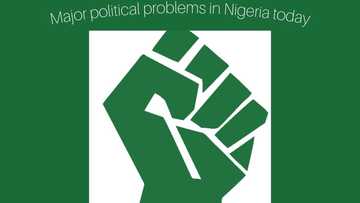Problems of universal basic education in Nigeria
The government of Nigeria launched a program of universal basic education to reduce poverty and illiteracy in the country. Was this initiative effective? How is it working today and what challenges does it face in our country? Keep reading our post below to find out about the major problems of universal basic education in Nigeria.

Source: UGC
The level of the development of the education sphere shows the level of development of each particular country on the planet. That is why it is so important to know about the problems in education in your country.
We believe that every Nigerian should know about the challenges of the universal basic education in Nigeria faces every day. As it is said if you the enemy in the face it will easier to defeat him. That is why we have decided to devote our post to such a critical question.
What are the problems of universal basic education in Nigeria
Let`s consider the top-13 problems the UBE programme in Nigeria is facing today.
1. Inadequate funding
The aim of the UBE programme is promising and beneficial for the Nigerian education programme in general. But it requires adequate funds for the achievement of its purposes and procedures.
The government adopted the UBE Act on May 26, 2004. This Act considers three sources of funding such as the federal, state, and local government. And precisely the federal government intervened in the general financial issue. Funds were found from domestic or foreign patrons. But it is not enough to achieve the UBE program goals and consolidated budget is too small.
2. Unlawful appropriation of accessible funding
It is not a surprise that a lot of funds for achievements of the UBE programme were misused. This problem is evident in class equipment, namely children have to sit on the bare floor, so there is no appropriate furniture for the convenience of kids. The blackboards are in no better condition than class furniture. All this means that the significant part of the funds is misappropriated and misused.
3. Venality
The problem of corruption is not new not only in Nigeria but all over the world. And it stops development of the UBE programme. Corrupt executives who took the responsibility of distributing state funds to the appropriate areas use it in their own purposes. Corruption is something that is difficult to root out but is one of the main challenges not only in the education sphere.

Source: UGC
READ ALSO: Problems of adult education in Nigeria
4. Cronyism
This problem is widespread all over the world, and, unfortunately, in Nigeria too. It also affected universal basic education development. Many executives are employed based on the benefits of knowing someone who is in the leading position of authority. In this way, some of them work worse expectation because of friendship, and these ties restrain the development and success of the UBE programme purposes.
5. Lack of adequate and qualified employees
At the moment, we can observe the insufficient staffing of graduates from pedagogical universities due to low salaries and the impossibility of self-realization. Unfortunately, a lot of jobless people seeking to work with UBE have no experience or skills.
When inexperienced staff is finally employed to undertake and try to work, they will slow down the whole mechanism of the universal basic education programme. Qualified and educated staff is one of the vehicles needed for the achievement of the plan.
6. Incompetent planning
Everyone knows if you want to have great success, you have to make a plan. Inefficient planning puts the progress and the implementation of the UBE programme at risk. There are primary reasons for inadequate planning, and they are the following: wrong demographic data and inappropriate researches. If there is incomplete planning, how all the system will achieve the desired purpose and goals?

Source: UGC
7. Improper inspection
The UBE Act 2004 created the Universal Basic Commission (UBEC) on the 7th of October, 2004. It was made for regulating the implementation of the programme at the state and local administration. State Universal Basic Education Board (SUBEB) of each state and the Local government Education authorities (LGEAs) implement it. Incorrect and inadequate inspection can lead to the unfortunate implementation of the programme.
The proper inspection can help us to see the good results of the programme. For example, if schoolchildren are attending classes in a hostile and unfriendly environment, local authorities during the inspection will eliminate this problem quickly. If there are non-qualified personnel, the appropriate control will resolve this in time. If there are lack or disappearing of local funds from the state budget, the adequate inspection will also eliminate such a gap. So, if such problems as non-qualified personnel, poor class equipment, inappropriate conditions for kids, etc. then we must admit that improper inspection is a big problem too.
8. Weak administration
Weak administration is one of the main issues affecting the realisation of the UBE programme in Nigeria. The various successful plans were interrupted due to inadequate control. Because of this problem, the activity of many primary schools is rapidly declining, which leads to worse functioning of the UBE programme in Nigeria.

Source: UGC
9. Incomplete projects
When production of the new projects begins, and there are no available funds for its full and successful implementation, it leads to various unfinished projects. Authority also makes a huge mistake categorising them as successful ones. Such activity only slows down the progress of the UBE programme in Nigeria.
10. The necessity of confidence, responsibility, and sincerity
The majority of employed stuff is not confidence, responsible, and sincere in completing the purposes and aims of the UBE programme in Nigeria. Such personal qualities are three vehicles in the development of the universal basic education programme.
11. Stagnation
This problem means the lack of novelty in the learning process, which leads to misunderstanding by students of studying material and teacher at all.
12. Depletion of knowledge
It implies the insufficient speed of updating the existing information in the process of its transfer from a teacher to student, using traditional means of teaching.
13. Lack of interest
There is a lack of schoolchildren`s and students` motivation to learn, due to the invariance of the methodology of each lesson.

Source: UGC
Based on the previous information, we want to highlight the main inhibitors of the progress of the universal basic education programme:
- For many years nothing radically new and interesting was introduced into this programme, only the methods and ways of perception were changed. They were emphasized in the transmission of information, which gave rise to a certain "stagnation." The textbooks developed in the past years are not sufficiently informative and suitable for learning, due to the complexity of the narration, some inaccuracies and the expression of one author's view on controversial issues.
- The existing training procedure does not cope with the amount of information and the requirements of the society assigned to it. As a result, after graduation from an educational institution, there is a need for re-certification and advanced training of graduates, which negatively affects both the position of education in society and the personal attitude to the gained knowledge.
- As you know, the process of introducing innovations, which, in most cases, are thought out and promoted by young and energetic people, does not occur due to their absence in places of education. The educational process is led by old school teachers who rely on their experience and proven books, rather than the "creative ideas" of the younger generation.
- At the moment, the method of making a lesson and the knowledge invested in it is not an effective way to transfer information, due to the extreme lack of interest of children in traditionally obtaining knowledge. So, now among the first priorities also should be increasing the motivation for the learning process among pupils and students.
If the problems listed above will be solved, all the purposes of the universal basic education programme will be fulfilled. These challenges are like spokes in a wheel; the programme will not move further if the government will not put all their effort into changing the current situation.
READ ALSO: Social problems in Nigeria and solutions
Source: Legit.ng







